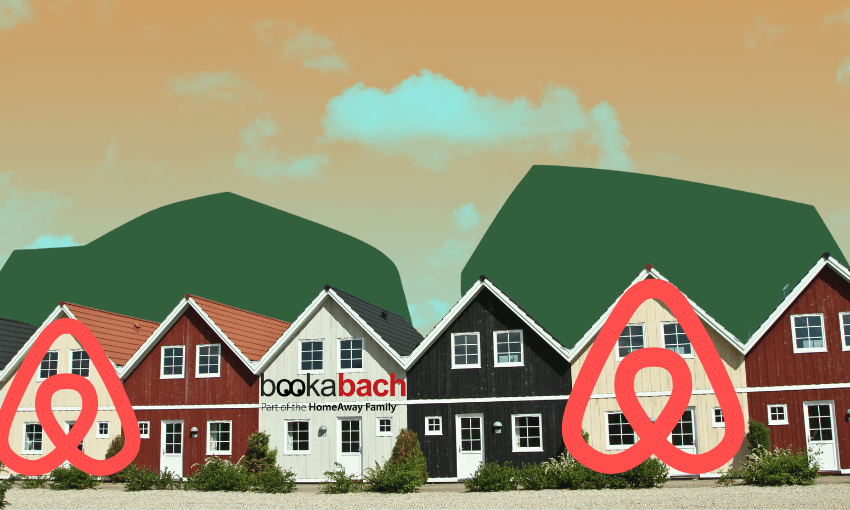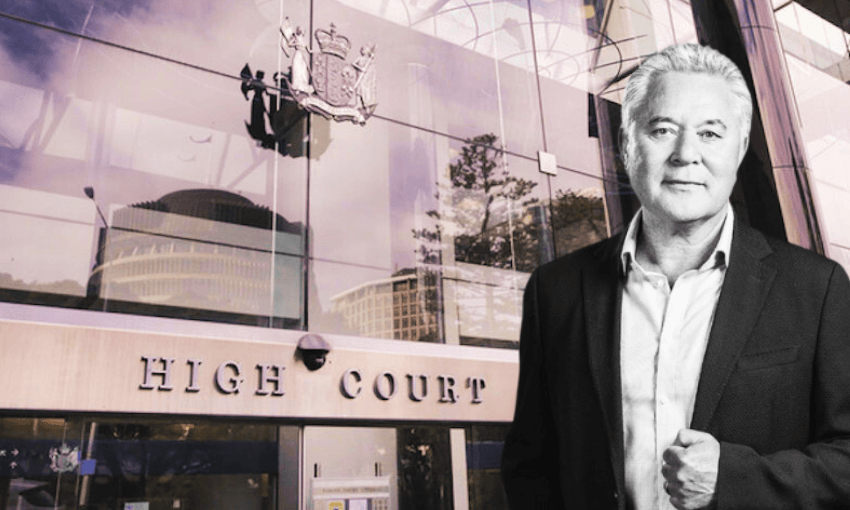As Wellington City Council contemplates changing rates for Airbnb owners, what can it learn from councils who have been there, done that?
The first thing you encounter when scrolling through Airbnb, the ubiquitous accommodation booking website, is the abundance of options. Dozens of plump pillows arranged on tidy beds. Lots of grey carpets and greige walls. Turquoise blue pools, a picture of a cottage with a rainbow arching over the roof. Fifteen pages of options of people’s houses to stay in.
That’s just in Christchurch – probably not the most popular holiday destination in New Zealand. Search Airbnb or similar platforms, like Bookabach, for “Queenstown” and dozens of options pop up, more and more appearing as you zoom into the map. The Taupō area, similarly, has 690 Airbnb options displayed for a weekend in April, while the much larger cities of Wellington and Auckland have 770 and over 1,000 respectively.
There have long been concerns that areas with high short-term visitor accommodation options enabled by platforms like Airbnb exacerbate housing shortages. Not according to Airbnb, though: the platform commissioned economist Brad Olsen last year to do a survey of the impact short-term rental accommodation had on housing prices in Auckland, Wellington, Queenstown and Christchurch. The analysis suggested that housing supply, mortgage rates and population had a much bigger impact on housing costs than short-term rental accommodation. To really hammer the point home, Airbnb tagged this article on its website with the label “airbnb not responsible for housing crisis”.
Nonetheless, Queenstown, Christchurch, Rotorua and Thames-Coromandel councils have added or considered extra regulations for local property owners renting their houses through short-term visitor accommodation platforms. The latest is Wellington City Council, which is discussing charging Airbnb owners commercial rates.
Wellington could look to other councils which have already put regulation into place. “We heard a lot about the impact of [short-term rentals] on housing in Queenstown before Covid,” said Julie Scott. Scott is the CEO of the Queenstown-Lakes Community Housing Trust, the main provider of affordable housing in the district where Kainga Ora has a minimal presence. “it was phenomenally more rewarding for landlords to turn their properties to short term, not long term rentals.”
Queenstown Lakes District Council has placed regulations on short term rentals, including that resource consent is required in some cases. Airbnb and bach owners also have to pay commercial rates (which are generally significantly higher than residential) have to be paid, under different conditions – 25 – 35% more if you’re living on the property or renting it less than 181 days a year, and 50-80% more if you’re renting the property more than 181 days a year. Yet because there are so many other factors, like the increase of tourists and short term workers following Covid, Scott says it’s difficult to tell whether these regulations have led to more houses being used for long-term rentals in Queenstown, especially because changes in the tourist market following Covid and interest rates impacting house prices are also a factor.
Voluntary compliance in Christchurch
Christchurch City Council has also regulated short-term accommodation, requiring resource consents for people putting their houses for rent in residential zones. However, the impact has been minimal; while at least 700 properties were available in the city on Airbnb on a weekend in April, only 48 people have been given resource consents, and only 148 have notified the council that they are operating accommodation in their homes. Yet, as scrolling through listings shows, there are hundreds of people operating Airbnbs in Christchurch without consents or notifying the council.
Applying for the consent costs $1,000, and requires proof that surrounding properties won’t be too affected, including information about parking, how many nights a year the house will be occupied and what instructions guests get when they arrive at the property. “Removing the fee would likely result in more operators applying for consent, but the cost would then fall on ratepayers,” said the council’s head of planning and consents, Mark Stevenson.
However, there’s minimal enforcement of the rules, because the council has nobody assigned to checking on short-term stay providers. The council’s compliance team is creating a job to do this. “Until this role is established and filled, the team will continue to provide a reactive compliance response utilising existing personnel,” said Tracey Weston, the council’s head of regulatory compliance.
Regulating short term visitor accommodation gets to the heart of tensions between residents in holiday hotspots and tourists, who are a source of income but also place pressure on resources like housing, parking and water without paying rates or income taxes. In the Mackenzie District, popular with tourists for the glacial blue lakes, fields of candy coloured (invasive) lupins and access to Aoraki National Park, housing shortages have been hotly debated in the long term plan, with the mayor calling out a “proliferation” of Airbnbs. In Thames-Coramandel and Rotorua, both with locals struggling to find housing, limits have been set on how many people can stay in an Airbnb. Tourists keep coming to these places – but housing remains out of reach for many, too.
Airbnb has been largely resistant to these kinds of regulation. Instead, it has said that it “is committed to empowering everyday Kiwis to combat costs of living through hosting and travel”. (Airbnb did not explain how travel would counteract the cost of living.)
“In a survey of hosts on Airbnb last year, 53% said they used money from hosting to cover food and other costs that have become more expensive, while 41% said they used the money from hosting to help them stay in their homes,” Michael Crosby, the Airbnb head of public policy for New Zealand, told The Spinoff, adding that the platform supports local economies through providing cleaning work and customers for businesses.
Airbnb has suggested nationwide, rather than council-specific, policy for short term rentals, with a visitor levy to fund better tourist infrastructure. Some nationwide regulation exists; since April 1 2024, Airbnb providers have had to pay GST on their earnings, although short stay accommodation is excluded from the Residential Tenancies Act.
“The requirement to pay GST has definitely reduced profit and made some people think twice about renting their properties,” says Scott. The increased administration load has also made stable long term tenancies more appealing for some landlords.
Regardless of whether the regulation is enforced, regulations do change people’s behaviour around buying properties to rent. Alex*, a Canterbury resident who lives in a rural area, has been considering buying a property in central Christchurch to rent through Airbnb or a similar platform. “I want the ability to come to the city to stay when it suits, obviously would have to book in advance, which is why a short term rental would suit my situation,” he told The Spinoff. He’s reluctant to pay for a resource consent, and sees the possibility of the council increasing enforcement as a “major risk” which would make having a second property unprofitable. “I have made the decision to try and purchase a property that is not in a residential zoning, which would mean a resource consent for short term rentals would not be required,” he said.
What Scott thinks other councils can learn from Queenstown’s efforts to regulate short-term rentals is that there’s “no silver bullet”. In her work, affordable housing can’t solely happen through addressing the tourist platform. Instead, it happens through policies like inclusionary housing, which ensures that part of new housing developments are set aside for affordable housing, and simply building more houses. “People think a 300sqm freehold section is dense, but we need to go up, not out,” she said. For people to live in a place and make it thrive, there needs to be somewhere for them to live, whether there are lots of tourists or not. “I think we’re always going to see a demand for affordable [long term] rentals.”


